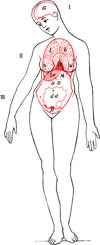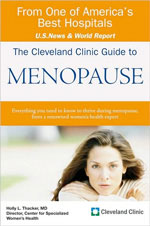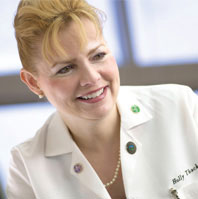A world-renowned women’s health expert sounds off on Suzanne Somers, painful sex, and the mistake 99 percent of her patients make.
- FOF: What happens to our bodies during menopause?
 Dr. Thacker: Once women go into menopause — as a result of surgery or naturally — estrogen levels drop. This can cause a host of symptoms, primarily, the vagina can get thin, as can the lower part of the bladder and the bones. One in two women get osteoporosis, and probably eighty percent of them have some sort of changes in their vagina and bladder.
Dr. Thacker: Once women go into menopause — as a result of surgery or naturally — estrogen levels drop. This can cause a host of symptoms, primarily, the vagina can get thin, as can the lower part of the bladder and the bones. One in two women get osteoporosis, and probably eighty percent of them have some sort of changes in their vagina and bladder.
- What is the biggest misconception about menopause?
- That because menopause is natural, you don’t need medical guidance to deal with it. Pregnancy is natural, but you can still die in childbirth! I see so many women who make the mistake of trying to tough out the symptoms. I saw a woman today with severe vaginal thinning and atrophy from menopause. She had suffered for eight years without treatment.
- She just ignored the pain?
- Yes, until she started bleeding, was unable to have sex and finally sought help. Unfortunately, that is not unusual. Women are not being told about simple treatments. For instance, for women like the one I saw today, there are localized low doses of hormones and other medicines that only affect the genitals–there’s virtually no systemic risk at all. To be truly estrogen deficient and suffering should not be the case.
- Are there other symptoms that might be menopause related and women don’t realize it?
- Yes. High cholesterol, sexual dysfunction, slowed metabolism, thinning hair. And sleep problems. Sleep disruption is probably the biggest reason why women stay on hormones long term.
- Should women be concerned about being on estrogen long term?
- The risks from hormone therapies are really very low. Even for women with breast cancer or blood clots. In the Women’s Health Initiative studies, eleven years of estrogen use did not cause any increase in breast cancer. In fact, it showed a 33 percent reduction in breast cancer for women with hysterectomies taking .625 estrogen, compared to women on nothing. Once you’re over 60 to 65, we do tend to lower the dosage because there’s a slight increased risk of stroke.
- Should everyone consider hormones?
- Everyone does not need them. If you have no symptoms and your bones and your genitals are fine, then that’s great. Just make sure someone is doing a good vaginal exam and checking your bone density every few years. And if you do need treatment, there are many non-hormonal options for bone loss, hot flash symptoms and sleep issues.
- It’s surprising that so many women are in the dark about menopause treatments.
 I am just flabbergasted, because it’s these baby boomer women who made the medical profession change and become more responsive to women. They demanded their partners be in the delivery room. Part of it might be that women are risk averse. So when all of those exaggerated, irresponsible headlines linking hormone therapy to cancer hit in 2002, women stayed away. And I think people don’t want to “medicalize” menopause, or say it’s a disease. Also, women put themselves last. They think, “I need to take care of my partner, or my elderly relative, or my kids,” before they think about their own pain and symptoms.
I am just flabbergasted, because it’s these baby boomer women who made the medical profession change and become more responsive to women. They demanded their partners be in the delivery room. Part of it might be that women are risk averse. So when all of those exaggerated, irresponsible headlines linking hormone therapy to cancer hit in 2002, women stayed away. And I think people don’t want to “medicalize” menopause, or say it’s a disease. Also, women put themselves last. They think, “I need to take care of my partner, or my elderly relative, or my kids,” before they think about their own pain and symptoms.
- It sounds like you think men would react differently to the same symptoms of menopause.
- Definitely. The bottom line is this: if men couldn’t sleep, had hot flashes, lost bone and muscle strength and saw their genitals shrink by 70 percent, and 99 percent could take a treatment and do well, there wouldn’t even be a question about it.
- What do you think of people like Suzanne Somers? She recommends hormones.
- The Suzanne Somers movement is unwise. Her message–that women deserve to feel good and enjoy sex–is right on. But the way she tells women to go about it is not scientific and is potentially harmful. That’s why I wrote my two books. They’re certainly not bestsellers like Suzanne Somers’s, but they’re just the facts.
- There is a lot of alternative medicine that is beneficial and well-studied, such as acupuncture and certain nutritional supplements. But there are also people out there who are basically snake oil salesmen. When a woman is not getting her questions answered, I can understand why she would turn to someone with a very good bedside manner but no science behind it.
- What type of doctor should a woman seek to treat menopause?
- A woman who goes to her OBGYN, internist or a specialist—such as a urologist–for her menopause symptoms may not receive complete treatment. None of those doctors is looking at the woman’s symptoms from a global “women’s health” perspective. OBGYNs are trained to deliver babies and do surgery on the reproductive system. Internal medicine is completely based on a male model. There are very few doctors who are certified in menopause and interdisciplinary women’s health.”
- Probably the closest thing right now is a menopause specialist. The North American Menopause Society credentials doctors as menopause specialists. A clinician has to pass a test in a number of areas to qualify. That’s an excellent resource for finding a doctor in this area.
- We actually have the world’s largest concentration of menopause experts here at the Cleveland Clinic.
- Can anybody go to the Cleveland Clinic to be evaluated?
- Absolutely. I saw a woman from Las Vegas the other day. She had just finished two years of injectable Forteo for her osteoporosis. That’s a very expensive therapy that builds up bone, and it needs to be followed up with other treatments. She went to two or three different doctors, and they were dropping the ball, so she came to see me. We took care of her hormones, helped her bladder and got her treated with yearly IV Reclast, so that she wouldn’t lose the bone she built on the Forteo.
- What are some red flag symptoms that women should know they don’t need to deal with?
- If you’re not sleeping well; if you’re flashing or having temperature regulation problems. Or it could be more subtle: dry skin, mouth or vagina, and bladder urgency or overactive bladder are sometimes linked to low estrogen. Some women have a lot more aches and pains because estrogen can affect the pain threshold. Women who have complex family histories, lots of symptoms, or histories of blood clots, as well as women who had different kinds of cancers could certainly benefit from seeing a menopause specialist.
| Author | |
 |
Cleveland Clinic Center Dr. Holly Thacker, MD, FACP is the director of the Cleveland Clinic Center for Specialized Women’s Health, one of the world’s foremost clinics for women. She has authored two outstanding books on menopause and hormones and is a recipient of the “Lila Wallis Women’s Health Award” in recognition of her lifetime achievement in the field. She’s also a straight talker and a totally FOF woman. |


0 Responses to “The Menopause Monologues”
Orlando Hillan says:
I’d rather have Lin Dans WC-final T-shirt!!!
LeMetric says:
ladies, after reading this wonderful information, it created a fire in my soul. Hair loss is still an issue that effects how we feel, how we act, how we are treated, and finally and the most obvious, how we look. Somehow this whole aging thing sometimes can be to much. So, ladies there is something we can do. We can either do a little something or do alot of something. My personal opinion, because I deal with my own hair is. I do not want to change who I am, I just want to maintain that makes me who I am. I think all of us sometimes need to be reminded of that!!!!
Eastern Essentials says:
I am a Licensed Acupuncturist and Herbalist that developed a formula to treat menopause symptoms.
You can read about it or buy it here:
http://www.easternessentials.com/menopause-formula
This formula is designed to treat symptoms of menopause such as hot flushes (sometimes called hot flashes), sweating, menstrual irregularities, and mental disturbances such as anxiety and nervousness.
This remedy is based on a formula called, Two Immortal Decoction, that was developed by the Shuguang Hospital in Shanghai, China. Countless patients in China have been prescribed this formula to treat their menopause symptoms.
I made this remedy even more effective.
I added herbs that are known to stabilize the emotions, which is likely to be helpful at this time in a woman%u2019s life. I also added an herb, Wu Wei Zi, that has been used for centuries to reduce sweating. These improvements have resulted in a completely balanced herbal formula designed to support a woman during this difficult time in her life.
Ingredients:
Xian Mao (Rhizoma Curuliginis Orchioidis)
Yin Yang Huo (Herba Epimedii)
Huang Bai (Cortex Phellodendri)
Zhi Mu (Radix Anemarrhenae Asphodeloidis)
Ba Ji Tian (Radix Morindae Officinalis)
Dang Gui (Radix Angelicae Sinensis)
Long Gu (Os Draconis)
Mu Li (Concha Ostreae)
Yuan Zhi (Radix Polygalae Tenuifoliae)
Wu Wei Zi (Fructus Schisandrae Chinensis)
http://www.easternessentials.com/menopause-formula
Jeremy Speiser, L.Ac.
Eastern Essentials
Ancient Remedies for a Modern World
cookieis49 says:
please guide me in a direction for help. i am struggling greatly with hot flases and anxiety issures,have had my uterus removed ten years ago and have experienced these symptoms ever since. no doctor has been able to help. i live in whitney,texas, near fort worth,if you know of any menopause help in my area, i would be more than greatful!